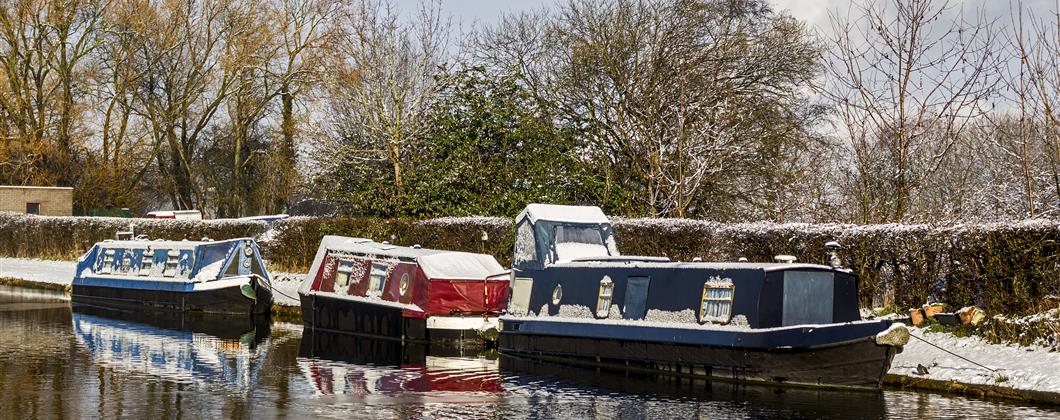How to Maintain Your Narrowboat Engine in the Winter

Winter brings challenges for narrowboat owners, especially regarding engine care. The colder months can harm your engine which may lead to expensive repairs if you skip maintenance. With some preparation and regular care, you can keep your narrowboat’s engine in great condition all winter.
Protect the Cooling System
One of the most critical steps in winter maintenance is safeguarding the cooling system from freezing.
- Check Your Antifreeze: Ensure your engine’s cooling system has the correct antifreeze mix. Antifreeze not only prevents freezing but also protects the system from corrosion.
- Flush the System if Needed: If the coolant is old or diluted, flush it out and refill with fresh antifreeze. Most manufacturers recommend a 50/50 antifreeze-to-water ratio but check your engine’s manual for specific guidelines.
A well-maintained cooling system prevents major damage like cracked pipes or an engine block, which can occur when water freezes and expands.
Keep the Battery Healthy
Cold weather significantly impacts your battery’s efficiency, making it harder to start the engine.
- Test the Battery: Use a multimeter (electrical measuring instrument) to check the voltage. A fully charged 12-volt battery should read around 12.6 volts. When the battery is below 12.6 volts, make sure to recharge.
- Charge Regularly: Use a trickle charger to keep the battery charged, especially if the engine does not run often. This prevents the battery from draining completely, which can reduce its lifespan.
Keeping your battery in good condition ensures you won’t face the frustration of a dead engine on a frosty morning.
Avoid Fuel Problems
Winter weather can cause condensation in the fuel tank. This can lead to water contamination and diesel bug problems.
- Fill the Tank: A full fuel tank minimises airspace, reducing the chance of condensation forming as temperatures fluctuate.
- Add a Diesel Treatment: Use a winter-grade additive. This will stop the fuel from thickening and protect against germs. Diesel bug thrives in water-contaminated fuel, so taking preventive measures is essential.
By addressing potential fuel issues early, you’ll avoid clogged filters or engine damage later.
Change the Engine Oil
Engine oil can thicken in cold weather, making it harder for the engine to start and operate efficiently.
- Switch to Winter-Grade Oil: If your engine manufacturer suggests a certain oil for winter, change it before the temperatures fall. Winter-grade oils are designed to flow better in low temperatures.
- Replace the Oil Filter: A clean filter ensures optimal oil flow and prevents contaminants from causing engine wear.
Fresh oil and a clean filter keep your engine well-lubricated, even in the coldest conditions.
Inspect Belts and Hoses
Winter weather can make rubber components like belts and hoses brittle, increasing the risk of cracks or breaks.
- Look for Damage: Check for visible signs of wear, such as cracks, fraying, or loose connections.
- Replace if Necessary: Replacing damaged parts early can save you from a breakdown.
Regular inspections keep your engine running smoothly and prevent unexpected issues.
Run the Engine Regularly
If you do not use your boat in winter, running the engine now and then is a simple and effective maintenance precaution.
- Start It Weekly: Running the engine once a week helps circulate oil, keeping internal components lubricated and preventing rust.
- Let the engine warm up: This allows it to reach its operating temperature. It burns off moisture and stops condensation from building up.
This habit not only maintains engine health but also ensures it’s ready to go when you need it.
Check the Air Intake and Exhaust
Blocked air or exhaust systems can cause serious problems, especially during winter.
- Keep Them Clear: Inspect the air intake and exhaust outlets to ensure they’re free of debris, ice, or blockages.
- Inspect for Leaks: Check the exhaust system for cracks or leaks, which can pose safety risks, including carbon monoxide build-up.
A clear, functioning airflow system is essential for safe and efficient engine operation.
Store Your Boat Safely
If your narrowboat will remain moored or unused for long periods, proper storage is vital.
- Use an Engine Cover: Insulated covers can help retain heat and protect the engine from frost.
- Think about Dry Docking: Lifting your boat out of the water helps prevent freezing damage to the hull and systems, such as the engine.
Proper storage minimises wear and tear and ensures your engine remains in good condition until spring.
Contact Collidge & Partners today.
As you can see, maintaining your narrowboat’s engine during the winter does not have to be complicated. However, it does require attention to detail.
Always seek professional advice to maintain your vessel and contact our friendly team for any insurance advice you may require.
